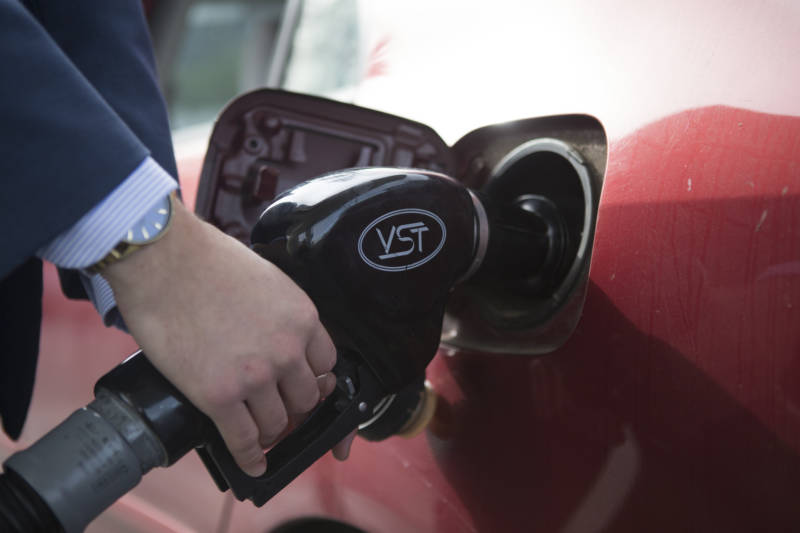“It’s heartening to know that California voters and taxpayers realize we have to fix the crumbling condition of our state highways and local streets and roads, that we need transit alternatives and traffic relief and that we need absolutely highway and bridge safety,” Guardino said. “That’s why they’re turning down this ‘U-turn to yesterday’ measure.”
Brown was the No. 1 cheerleader for SB 1, the bill that increased taxes and fees in order to raise $52 billion over the next decade and fund an ambitious program of highway and street repairs, transit projects and other transportation infrastructure improvements.
At a No on 6 celebration in Sacramento, the governor said the Prop. 6 result was “one of the most significant votes in America tonight, because where else have people voted to tax themselves to pay for what they need?”
The SB 1 tax increases — 12 cents a gallon on gasoline, 20 cents on diesel fuel, with steep jumps in vehicle fees — gained a two-thirds majority in both houses of the Legislature in April 2017 without a vote to spare.
Just one Republican voted for the bill — San Joaquin Valley Sen. Anthony Cannella. That sharp partisan divide set the stage for the repeal effort. Travis Allen, a GOP assemblyman from Orange County, launched a campaign to kill the new taxes as soon as SB 1 was enacted.
Allen’s effort, which sought only to kill the new taxes, faltered. A second drive, which had the expanded goal of repealing the higher taxes and amending the state Constitution to require voter approval of future hikes, succeeded in qualifying for the ballot.
That campaign, led by Carl DeMaio, a conservative radio talk-show host and former San Diego city councilman, focused on the cost of the new taxes and fees to Californians already struggling with the state’s high cost of living. It also charged that the new tax and fee revenue was bound to be diverted to uses other than transportation.
The repeal was embraced early on by California Republicans who, harking back to 1978’s Proposition 13 property tax initiative, saw the issue as one that could energize the party’s voters and help the cause of several congressional candidates facing tough races.
GOP gubernatorial hopeful John Cox made the repeal a centerpiece of his campaign and contributed $250,000 to the Yes on 6 campaign. The California Republican Party and the campaigns of Central Valley GOP congressmen Kevin McCarthy and Devin Nunes also made substantial contributions.
But with Gov. Brown in the lead, the No on 6 side built an unusual coalition of Democrats, labor unions, construction firms and traditionally conservative-leaning big business organizations like the state Chamber of Commerce.
Those groups raised nearly $50 million in the campaign to defend the gas tax and spent more than $35 million of that, according to the latest campaign finance reports.
Meantime, funding for the Yes on 6 side waned, with the campaign reporting $5 million raised and only $2 million spent.
In a statement issued four hours before the polls closed Tuesday, the Yes on 6 campaign characterized the election as a David vs. Goliath struggle in which it had been victimized by an allegedly misleading ballot title.
The Yes on 6 campaign’s DeMaio has threatened to launch a recall drive against Democratic state Attorney General Xavier Becerra, whose office produced the ballot title. A state court of appeal panel reviewed the ballot language, which was originally attached to Travis Allen’s repeal petitions, and ruled it was not misleading.
“Despite the ill-gotten victory that the politicians have won tonight by stealing votes, by changing the title on our initiative, you have so much to be proud of,” DeMaio told volunteers in San Diego on Tuesday night.
